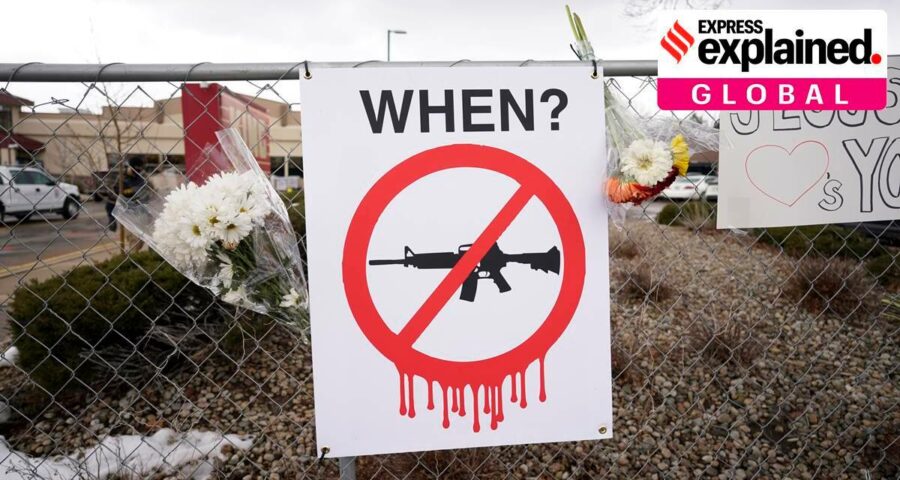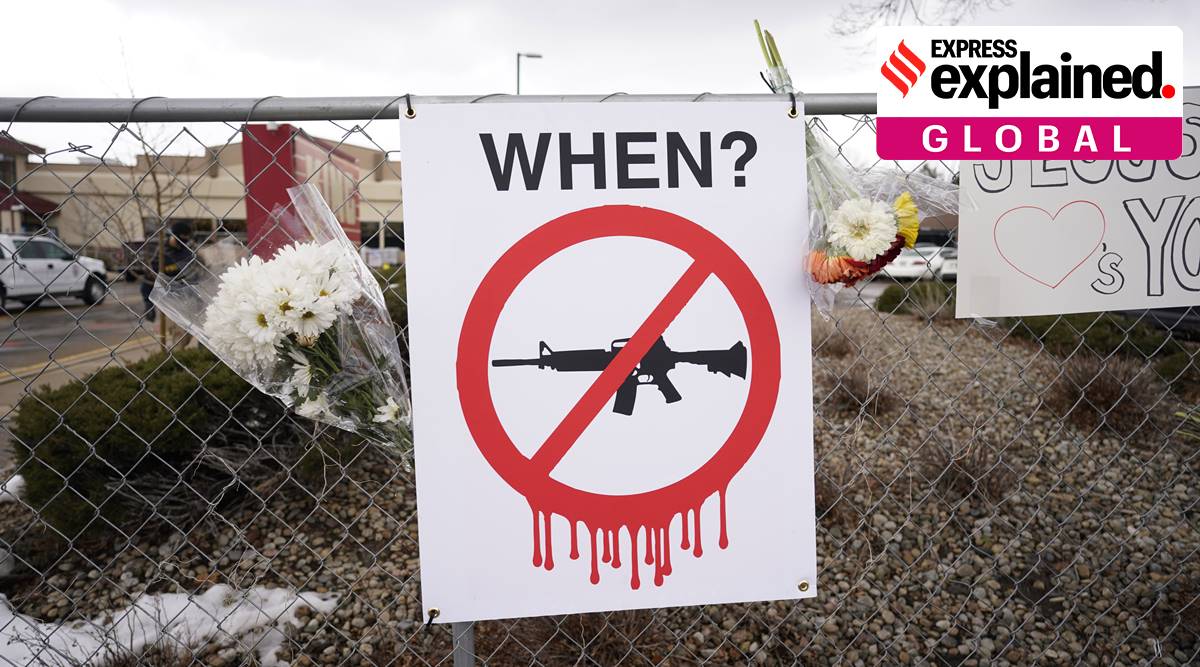Gun control laws in the US are under scrutiny once again after 18 people were killed in two incidents of mass shootings in a week.
In the past one week, the US has witnessed two mass shootings – one in Atlanta where eight individuals, including six women of Asian origin, were killed; and another in Boulder, Colorado, where a gunman killed 10 people inside a grocery store.
The two recent incidents have reignited the debate on gun laws in the US, a country with one of the most lax controls on gun ownership in the world. The US has the highest civilian gun ownership globally. According to RAND Corporation’s Gun Policy in America Initiative, there are about 12 firearms for every 10 civilians in the country. This may be one reason that the country sees greater rates of homicides — about six times higher than in other developed nations, according to a 2016 study.
What happened in Atlanta and Colorado?
On March 22, a gunman opened fire at a grocery store in Boulder, Colorado. The incident left 10 people dead, including a police officer, Eric Talley, who was one of the first respondents. The victims of this shooting were between the ages of 20 and 65.
In Atlanta, another man killed eight people after he went on a rampage at three spa locations on March 16. Six of the victims killed were women of Asian descent, which sparked fear and concern in the community. According to media reports, the suspect, who has been charged with eight counts of murder, told the police that he carried out the shootings to eliminate temptation because of his sexual addiction. But the police have not yet ruled out bias as a motive.
Gun control in the US
In the US, the right to buy a gun is written in the country’s Constitution and only a few people, such as those with criminal history or mental illness, may find it difficult to own a gun. Even so, while gun ownership is a right throughout the country, laws within different states vary about who can buy a gun.
Gun control in the US is rooted in the Second Amendment of the country’s Constitution. According to information maintained by the Library of Congress, in June 2008, the Supreme Court, for the first time since 1939, issued a decision interpreting the Second Amendment. At the time, the court ruled that the amendment gave the right to US citizens to possess a firearm for traditionally lawful purposes such as self-defence.
In 1968, following the assassinations of President John F Kennedy, Senator Robert Kennedy and Dr Martin Luther King Jr, Congress passed the Gun Control Act (GCA). The GCA aims to “keep firearms out of the hands of those not legally entitled to possess them because of age, criminal background or incompetency, and to assist law enforcement authorities in the states and their subdivisions in combating the increasing prevalence of crime in the United States.”
After this, in the 1980s when the US was experiencing high levels of gun violence in the midst of the crack epidemic, Congress enacted the Comprehensive Crime Control Act and the Armed Career Criminal Act, which increased the sentences of those individuals who were convicted of using firearms in crimes of violence.
A number of other measures were brought in after these laws. For instance, in 1986, the Congress loosened some of the controls imposed under the GCA, which made it easy for illegal gun traffickers to operate. In 1993, then President Bill Clinton signed the Brady Handgun Violence Prevention Act, which made it easier for persons engaged in firearms dealings to do a background check on their customers, making sure that felons and other prohibited persons couldn’t buy them.
Even so, there is no single law or provision in the Constitution that determines gun control today. In fact, there is little consensus among experts about which kinds of gun laws and policy can have tangible effects on curbing violence.
What do Americans think about gun control?
As per data compiled by the Pew Research Centre, about 30 per cent of American adults said they personally own a gun and an additional 11 per cent said that they live with someone who owns a gun. The results were compiled from a survey conducted between March-April 2017.
Further, as per this survey, about two-thirds of the gun owners said that one of the major reasons for owning a firearm was protection, followed by hunting (38 per cent), sport shooting (30 per cent), gun collecting (13 per cent) or their job (8 per cent).
The majority of Americans believed that gun laws should be stricter, according to a survey conducted in September 2019. But Americans were still divided over the idea if strict gun control laws would lead to fewer mass shootings, as per a poll taken in the fall of 2018, also by Pew. While 47 per cent of the people surveyed said there would be fewer mass shootings if it was harder for people to obtain guns, 46 per cent said that there would be no difference.
What is Biden’s take on gun laws?
In a statement issued in February, marking three years since a lone gunman killed 14 students and three educators at a school in Parkland, Florida, the current US President Joe Biden called gun violence in the US an “epidemic”. He said, “Today, I am calling on Congress to enact common sense gun law reforms, including requiring background checks on all gun sales, banning assault weapons and high-capacity magazines, and eliminating immunity for gun manufacturers who knowingly put weapons of war on our streets.”
Following the recent incidents, Biden has called for the Congress to work on stricter gun control measures. Broadly, there has been a divide in how Republicans and Democrats see gun laws. While the Republicans have typically resisted making gun control stricter, Democrats have supported it.
On Tuesday, Biden called on the Senate to pass two bills which were cleared by the House of Representatives on March 11. The provisions under these bills will widen background checks on gun buyers. In addition to this, Biden has also asked that assault-style weapons be banned. Significantly, stricter gun control was one of the campaign promises made by Biden.
Source: Read Full Article


